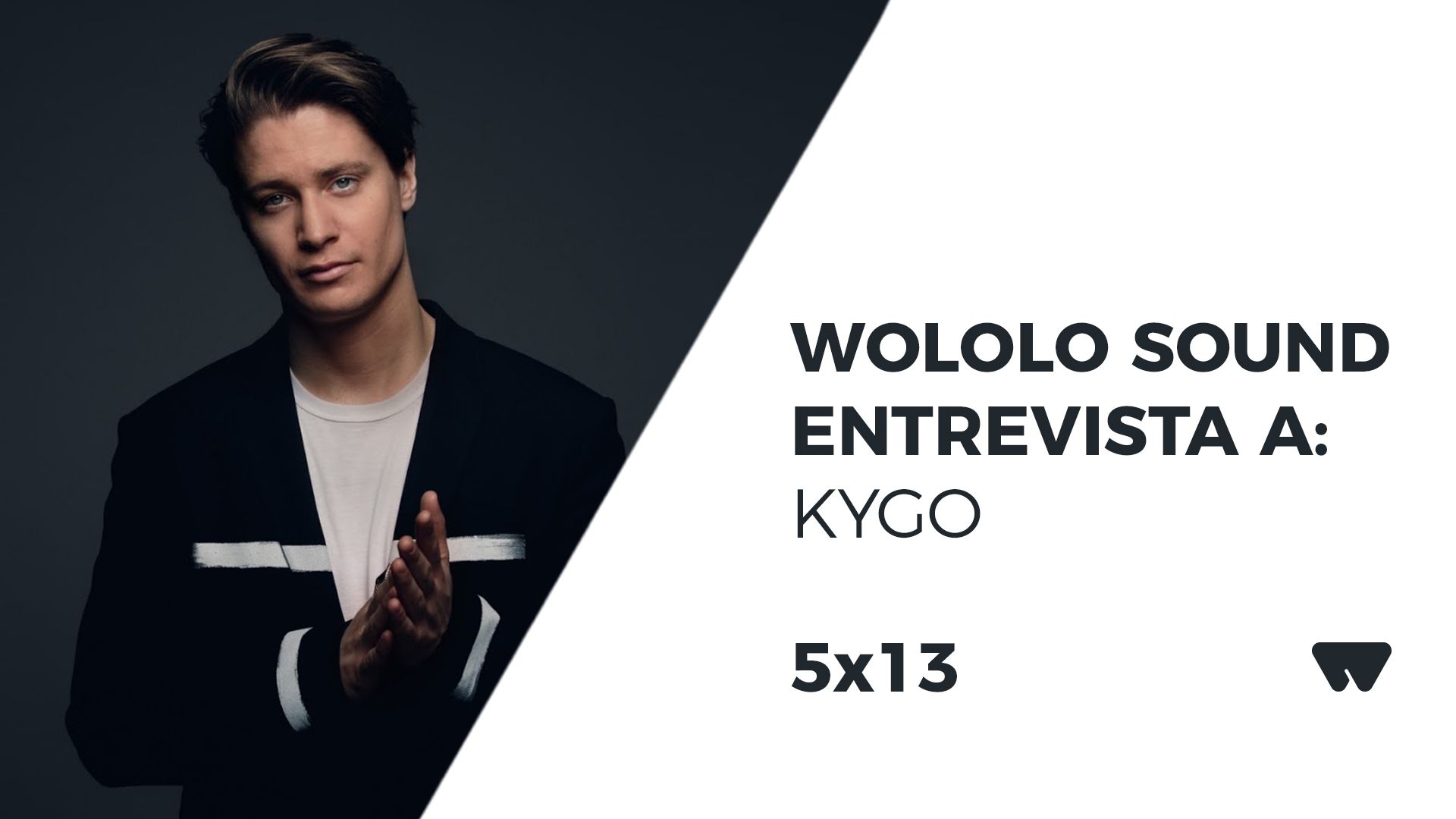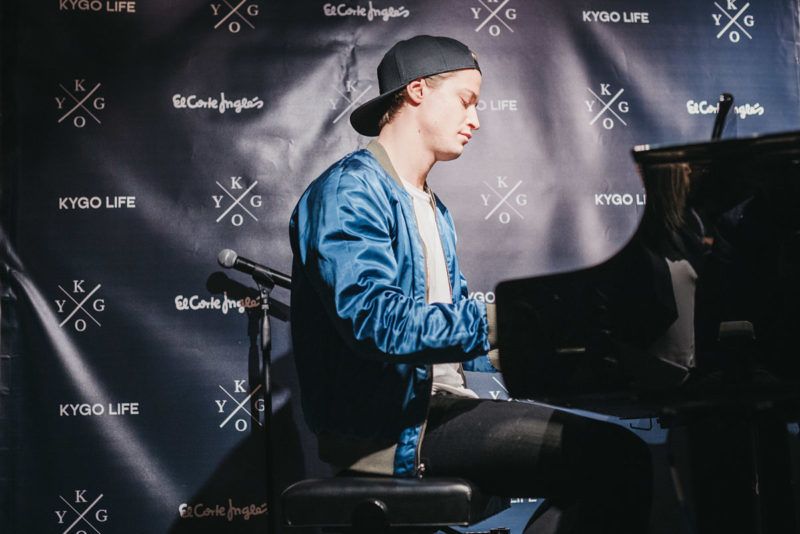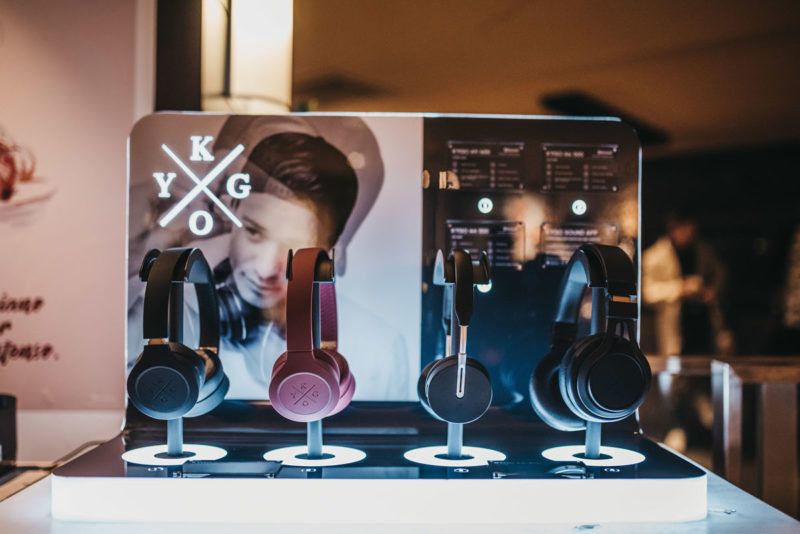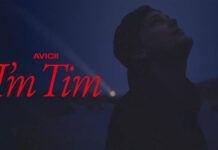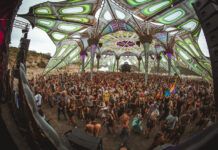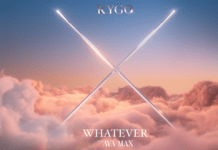Uno de los artistas más demandados en la actualidad, ha visitado España para presentar su nueva línea de productos en El Corte Ingles. Kyrre Gørvell-Dahll, más conocido como Kygo, no necesita presentaciones ya que es una de las grandes superestrellas de la música electrónica. Con su sencillo ‘Firestone‘ se dio a conocer mundialmente y, desde entonces, ha seguido creciendo con cada trabajo que ha lanzado, destacando sus dos álbumes ‘Cloud Nine‘ y ‘Kids In Love‘. Os dejamos con el noruego:
ENTREVISTA:
WS: Hola, Kyrre. Es un placer tenerte con nosotros.
Vamos a empezar con algo básico: Desde tus inicios has apostado por un estilo musical muy propio y diferente a lo que estaba de moda. ¿Cuáles han sido tus influencias musicales para crearlo?
Kygo: Me inspiré en mucha gente diferente. Cuando empecé a hacer música electrónica Avicii era mi inspiración. Empecé a hacer música por él y por aquella época produje música muy similar a la suya. Quería sonar como él, pero bueno, todo el mundo quería sonar como Avicii o Swedish House Mafia. Luego descubrí que quería sonar de mi propia manera. Creo que cuando experimentaba en el estudio escuchaba a un productor noruego llamado Finnebassen, a Lemaitre y a un productor sueco llamado Oliver Nelson, otra de mis inspiraciones.
WS: Hello, Kyrre. It is a pleasure to have you here with us.
Let’s start with something basic: since your beginnings, you have firmly aimed for a different musical style that was out of the mainstream. Which were your influences to create it?
Kygo: Well, I was inspired by a lot of diferent people. When I started making electronic music Avicii was my inspiration. This is why I started making music and I started up producing very similar music as him. I kind of sound like him but so, like the rest of the world. Everybody wanted to sound like Avicii or Swedish House Mafia. I figured out I wanted to try to do my own way. I guess I was experimenting in the studio I was listening to a Norwegian producer called Finnebassen, Lemaitre and then a Swedish producer called Oliver Nelson, one of my inspirations. So, there are lot a different producers but I guess I was trying to find my own sound and my own lane and trying not to sound like anyone else. So I think yeah, everything just happend, actually was just me having fun in the studio.
WS: Algunos hasta te consideran el verdadero creador de un estilo: el tropical house. ¿Cómo se asume este hecho? ¿Se nota cierta “presión” a la hora de publicar un nuevo single cuando millones de fans esperan tanto de ti?
Kygo: No buscaba el tropical house en un principio. Como he dicho antes, simplemente busco divertirme en el estudio y hacer música, por lo que supongo que el nombre vendría después, porque a Thomas Jack -un productor de aquel entonces- se le ocurrió el nombre y estaba haciendo música similar. Pero nunca me gusta clasificar mi música como tropical house. Tan solo quiero hacer lo que me apetezca. Por otro lado, el tropical house no tiene mucho sentido porque no es un estilo de música tropical. Creo que fui la cara de ese género por un tiempo. Y cuando publico nuevos trabajos intento no pensar en la presión, tan solo en hacer lo que me gusta, hacer música, divertirme y tratar de no pensar mucho en lo demás.
WS: Some people consider you the true creator of a musical genre: tropical house. How can someone assume this? Do you feel any pressure at the time of releasing a new single when millions of fans expect so much from you?
Kygo: I wasn’t looking for tropical house. As I said, it was just me having fun in the studio and making music and I guess that the name kind of came after, because someone like Thomas Jack, was another producer at the time, came with the name of tropical house who was making similar music. But I never liked to clasify my music as just tropical house. I wanna just be able to make whatever I feel like making. In the other hand tropical house cannot make sense because it wasn’t like a kind of tropical style of music. I think I was just producing this style of music and suddenly started getting very popular and I guess I was the face of tropical house for a while. I think when I release music I try not to think about the pressure, I try to still do just what I love, make music and have fun and I try not to think to much about anyone else.
WS: Hace cinco años era impensable ver a un DJ de tu estilo en el mainstage de un gran festival. ¿Qué crees que ha cambiado desde entonces?
Kygo: Recuerdo la primera vez que iba a pinchar en un mainstage, creo que era TomorrowWorld en 2014, hace cuatro o cinco años. Era muy escéptico. Estaba nervioso porque creía que a nadie del mainstage le iba a gustar mi música, porque es muy diferente a lo que el resto estaba pinchando, que era música más dura, y entonces salí con música diferente y relajante. Después de esa actuación la reacción fue increíble, creía que la gente me iba a odiar por: “Oh, esta música es demasiado suave”… Porque es lo que pensaba mucha gente de la comunidad EDM, que yo era demasiado suave. Pero después de esa actuación en TomorrowWorld creo que la gente empezó a apreciar el oír cosas diferentes, porque hay DJs pinchando desde la una del mediodía hasta la una de la madrugada, por lo que son 12 horas de música y todos los DJs pinchan el mismo estilo de música. Así que creo que cuando pinché durante la puesta de sol de seis a siete de la tarde la gente apreció el respiro de todo el rato los mismos drops. Creo que la gente conectó con mi música y, a partir de ahí, no ha habido ningún problema. A no ser que pinche muy tarde, porque cuanto más tarde es la gente quiere más caña, pero si pincho durante las puestas de sol y tal, la gente aprecia ese descanso entre tanta música llena de drops y música más heavy.
WS: Five years ago it was impossible to see a DJ on mainstage in a big festival playing this kind of music. What do you think that has changed since then?
Kygo: I remember the first I was gonna play mainstage, I think it was TomorrowWorld in 2014, four or five years ago. I remember I was very sceptical, I was very nervous because I thought no one on the mainstage was gonna like my music because is very different from everyone else is playing, like super hard music and then suddenly I came there with very relaxing you know, that kind of chill out music. After that performance the reactions were incredible, I thought I was gonna be hated with “oh this music is too soft” because a lot of people in the EDM community thought I was too soft. But after that performance at TomorrowWorld I think people really apreciated to hear something different. Because the DJs plays from 1:00 in the afternoon until 1:00 in the morning, like 12 hours of music and every DJ plays same style of music. So I think when I play during the sunset I think I play to 6:00 to 7:00 I think that people just really apreciated kind of brake of the same drops all day. I think people really conected with my music and after that, as long I dont play too late because late in the evening people want to rage, if I play in the sunset I think people really apreciate the kind of brake between all the heavy tracks.
WS: ¿Qué significó ‘Firestone‘ para Kygo? ¿Cómo cambió tu vida la repercusión mundial de esta canción?
Kygo: ‘Firestone‘ fue mi primer tema original y más o menos el comienzo de todo. Tan solo hacía remezclas, tenía algunos fans en internet antes de ‘Firestone‘, pero cuando lo lancé fue cuando todo pasó de ser tan solo remixes online al siguiente nivel, a ser un artista de verdad. Así que ‘Firestone‘ lo cambió todo. Fue el comienzo de todo. Nunca esperé que esa canción consiguiera todo eso. Me encanta la canción y estaba muy muy feliz, pero era mi primer tema y no sabía qué esperar. Y cuando lo lanzamos y vi las críticas y cómo estaba funcionando fue una locura. Uno de esos momentos en los que pensaba que estaba soñando.
WS: What did ‘Firestone‘ mean to Kygo? How did the impact of this song change your life?
Kygo: ‘Firestone’ was my first original song and I was kind of the start of all the whole thing. I was doing remixes, I had some fans online before ‘Firestone’, but when I released ‘Firestone’ that was really when we took everything from just being just online remixes to the next level, to actually to be a real artist. So ‘Firestone’ changed everything. It was the start of everything. I never expected that song to do that. I love the song and I was very very very happy but it was my first song so I didn’t really know what to expect. Then we released it and when I saw the reactions and how well works it was crazy. One of those moments when I thought when I was dreaming.
WS: Eres un gran pianista y es algo que has aprovechado para incorporar a tus shows. ¿Ha ayudado esto a la hora de preparar tus producciones?
Kygo: Bueno, he tocado el piano toda mi vida. Y está claro que si no hubiera tocado el piano cuando era más joven no me habría sido posible hacer la música que hago hoy en día. Siempre empiezo con piano o teclado y a partir de ahí intento sacar melodías y tal. Así que sí, no sería capaz de hacer la música que hago hoy en día si no tocara el piano, por lo que es una parte muy importante de todo el proceso.
WS: You are a great pianist and that is something you have adapted to your shows. Has this helped at the time of producing new tracks?
Kygo: Well, I have been playing the piano my whole life. And definitely, if I didn’t play the piano when I was younger I don’t think I would have been able to make the music I make today. I always start on a piano or a keyboard and I try to come up with some melodies and stuff. So yes, I wouldn’t be able to make the music I make today if I didn’t play the piano, so that’s definitely a very very important part of the whole thing.
WS: Has tenido residencia en Ushuaia Ibiza este verano ¿Qué te parece España? ¿Conoces algo más de nuestro país o de su escena de música electrónica?
Kygo: He pinchado mucho en Ibiza y me encanta España, el tiempo es genial. Especialmente comparado a Noruega, donde siempre está lloviendo y hace frío, lo cual también está bien. Cuando vengo aquí siempre hace buen tiempo. Este verano creo que hizo demasiado calor, pero sí, para mí que vengo de Noruega es genial saber que siempre tendré algo de verano y algo de sol. He pinchado mucho por aquí: en Barcelona un par de veces, Ibiza… y creo que la escena musical es genial. Pinché en el Barcelona Beach Festival, cuyo público es probablemente uno de los mejores para los que he actuado. Era un público que amaba la música.
WS: You have had a residency in Ushuaia this summer, what do you think about Spain? Do you know anything else from our country and its music scene?
Kygo: I have played a lot in Ibiza and I love Spain, the weather is great. Especially compared to Norway where it is always raining and cold, which is very nice too. When I come here it’s sunny all the time. I guess it was too hot this summer but yes, for me coming from Norway it’s great to get some summer and some sun when I come. I have played a lot here: I played Barcelona a couple of times, I have played Ibiza, and I think the music scene is great. I played Barcelona Beach Festival, which is probably one of the best crowds I have played for. It was definitely a music-loving crowd.
WS: Hablemos de ‘Happy Now‘, tu último single. ¿Cuándo y cómo surge la idea de este pequeño homenaje a Avicii?
Kygo: Sandro Cavazza, que es quien canta en el tema, y yo estábamos en el estudio en Los Ángeles en mayo, justo un mes después de que falleciera Avicii. Y él ha cantado en cuatro canciones de Avicii, lo cual es bastante, y también en algunas que no han salido a la luz. Lo descubrí a través de la música de Avicii y he sido fan suyo durante años. Hablamos y decidimos meternos en el estudio. No íbamos buscando un tributo, queríamos conectar el uno con el otro. Pero hablamos mucho sobre Avicii y cómo su música ha significado tanto para ambos que nos pareció buena idea hacer esta canción. No como un tributo a Avicii pero por supuesto tratando lo que hablamos e inspirado en su estilo de música.
WS: Let’s talk about ‘Happy Now’, your last single. When and how does the idea of a little tribute to Avicii come up?
Kygo: Me and Sandro Cavazza, who is singing on the track, were on the studio in May in LA, just one month after Avicii passed away. And he has been singing on four of Avicii’s songs, which is a lot and also on some unreleased tracks. And I found him through Avicii’s music, I have been a fan from him for years. We just talked and decided to get in the studio. It was not just necessary to make it a tribute, we wanted to connect with each other. But in the studio we talked a lot about Avicii and how his music has meant so much for both of us. So it kind of felt right for us to make this song, not like a tribute to Avicii but it was definitely about what we talked about and inspired by his style of music.
WS: Este año hemos visto a varios DJs bajar su ritmo de actuaciones o, incluso, dejarlo por un tiempo. Tú has colaborado con la campaña ‘Tomorrow Needs You‘ aportando 30.000 dólares. ¿Crees que la vida del artista está realmente sometida hoy en día a tal presión? ¿Qué debe cambiar en la industria para que el artista se sienta cómodo con su vida como tal?
Kygo: Creo que lo está, especialmente en la música electrónica pero en toda la escena musical, la gente ya ha visto muchos casos. No es solo Avicii, hay muchos artistas hoy en día que de repente se suicidan o tienen problemas con la adicción a las drogas. Así que sí, creo que hay muchísima presión en la escena. Y hay mucha gente que quiere un pedazo de ti: el sello discográfico quiere que hagas música, la agencia de booking quiere que des bolos, los fans quieren verte… Los artistas están sometidos a mucha presión y necesitan un buen equipo que los refugie de todo ese ruido. Eso es muy importante y también centrarse en la salud mental. Debería hablarse más de esto y sobre todo que la gente no se avergüence de tener problemas de salud mental porque por desgracia es algo muy común hoy en día.
WS: This year we have seen several DJs slowing down the amount of shows or some have even stopped touring for a while. You have cooperated with the campaign ‘Tomorrow Needs You’ by donating 30.000 dollars. Do you think an artist’s life is under so much pressure nowadays? What has to change in the industry for artists to feel really comfortable with their lives?
Kygo: I think it is definitely, especially in maybe electronic music but in the whole music scene, people have seen so many. It’s not only Avicii, there are so many artists these days that suddenly commit suicide or they have drug problems. So yeah, I think that there is definitely a lot of pressure in the music scene. And there’s a lot of people that want a piece of you: the label wants you to make music, the booking agents just want you to play shows, you have fans that want to see you… So there is definitely a lot of pressure so I think it’s really important for an artist to have a team around them to kind of shelter them from all the noise. I think that is really important, and obviously focusing on mental health. It should be more talked about and people should’nt feel ashamed of having mental issues, because it’s very normal.
WS: Por supuesto queremos preguntarte por ‘Kygo Life’. Estos nuevos equipamientos de audio que hoy has presentado en El Corte Ingles prometen ser algo revolucionario en el mercado gracias al diseño escadinavo. ¿Qué nos puedes contar de este proyecto? ¿Cómo surge la idea de crear tu propia línea?
Kygo: Es algo en lo que he estado trabajando en Noruega desde hace tres años hasta ahora. La idea era que yo quería crear algo relacionado con mi pasión, que es producir música. La calidad de sonido me parece muy importante a la hora de producir un tema, ya que quiero oír cada detalle de la canción. Y la idea era poder decir algo sobre cómo deben sonar unos altavoces. Así que, durante el desarrollo de estos productos, he podido obtener críticas de especialistas que llevan haciendo esto 40 años y darles mi punto de vista sobre “creo que esto debería sonar de esta manera o de esta otra”. Esa era la idea y creo que ahora tenemos muy buenos productos que han estado en desarrollo y algunos nuevos que saldrán próximamente como el de cancelación de sonido, que es la última pieza de ‘Kygo Life’. El proyecto es muy emocionante para mí y es algo que he estado haciendo a la par que la música pero es muy divertido aprender cosas nuevas de estos tíos. Tenemos especialistas como Peter Lars, de Dinamarca, que lleva 40 años en esto y que lo sabe todo sobre sonidos y frecuencias. Y hay muchísimo que puedo aprender y quizás aplicarlo a la música para conseguir trabajos de mayor calidad con productos que suenan como quiero que suenen.
WS: We would love to ask you about ‘Kygo Life’. These new sound equipments that you show us today at El Corte Ingles, are promising to become something revolutionary in the market thanks to their Scandinavian design. What can you tell us about this project? How did it come up?
Kygo: It’s something I’ve been working on for three years now, in Norway. I think the idea was just that I wanted to create something related to my passion which is producing music. Sound quality is really important for me when, when I produce I want to hear every detail of the song. And for me the idea was being able to have something to say about how headphones should sound. So now, in the development of all these products I have been able to get my feedbacks from specialists that have been doing this for 40 years and then keep them coming with my feedback and “well I think it should some more like this or like that”. So that was the idea and now I think we have a lot of very good products that we have been developping and we have some new products coming out like the noise-canceling, which is kind of the last piece of ‘Kygo Life’. So I think the project is really exciting and for me it’s something I have been doing as a sideproject to the music but it’s also a lot of fun for me to learn new stuff from these guys. We got specialists like Peter Lars, from Denmark and he has been doing this for 40 years so he knows everything about sounds and frequencies and there is definitely a lot of stuff I can learn from that and maybe I can actually make better music if I have products that sound the way I want them to sound.
WS: Musicalmente, ¿qué proyectos tienes a medio plazo? ¿Algo que nos puedas adelantar?
Kygo: Bueno, he estado trabajando en muchos temas nuevos. Acabo de lanzar ‘Happy Now‘ y tengo muchas canciones que están como al 99%, por lo que intentaré sacar una cada dos meses o así durante el próximo año. Hay mucha música en camino. Y aparte mi mánager y yo hemos comenzado con una agencia de management y un sello intentando firmar con artistas muy talentosos, lo cual es otro proyecto muy emocionante que tenemos en camino.
WS: Musically, do you have any mid-term projects? Something you can tell us in exclusive?
Kygo: Well, I have been working on a lot of new songs. Now I just released ‘Happy Now’ and I have got like a lot of songs which are 99% done, so I am going to try to release songs every couple months throughout the next year. There’s is definitely a lot of new music coming. And me and my manager started a management company and a label, so we are trying to sign talented artists, which is also a kind of exciting project that we have going.
WS: Terminemos con algunas preguntas cortas:
1. Artista con el que compartir un día de estudio: Ed Sheeran
2. Un festival: Coachella
3. Lugar favorito: Mi ciudad natal, Bergen
4. Un hobbie: Fútbol
5. Canción favorita: Ahora mismo… ‘Hearbeat’ de Haux.
WS: Now let’s end up with some short questions:
1. Artist to spend a day in the studio with: Ed Sheeran
2. A festival: Coachella
3. Favourite place: My hometown, Bergen
4. A hobby: Football
5. Favourite song: Right now… ‘Hearbeat’ by Haux.


